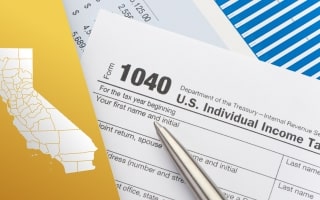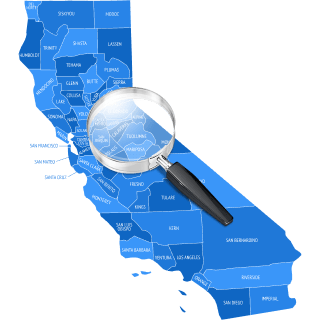Property Tax Records in California

One of the downsides to owning property in California is that you must pay annual taxes on it. Although California has some of the most expensive pieces of real estate in the country, it also has some of the lowest property taxes. While the national average is around 0.99%, the average tax rate in California is just 0.71%. This relatively low rate can be attributed to Proposition 13, which limits property tax increases and helps protect homeowners from sudden spikes in their tax bills. However, even with lower rates, the high property values can still lead to substantial annual tax payments.
The California State Board of Equalization (BOE) oversees county assessors. They monitor rates and how jurisdictions tax residents. They are also responsible for authoring property tax assessment policies, guides, and resource materials for the entire state of California.
Tax rates vary from county to county. Once an assessor identifies the value of your home, your local tax rate will be applied to it to determine how much you owe. You should receive your property tax bill in October. The first installment must be paid by November 1. As for the second installment, it's due on February 1. You can also choose to pay both installments at the beginning of November.
Before 1912, the state collected 70% of its revenue from property taxes. California's property tax system is now governed by Proposition 13, enacted in 1978, and details all the ins and outs of how tax rates are assessed, key players, and the entire process and how it works.
Property Tax Assessment in California

Each county in California collects a property tax. California has placed a 1% limit on how much taxes a county can collect from a single property. The 1% limit is based on a home's assessed value, which is equal to its fair market value. This form of taxation is called Ad Velorem, meaning "based on the property value." The California property tax rate can only increase by a maximum of 2% per year due to inflation.
Property taxes in California are due twice a year, November 1 and February 1. The county can charge you a 10% late fee if you don't pay them on time. California property taxes are actually way below the national average despite the rich real estate opportunities within the state.
The State-Assessed Properties Division is responsible for assessing all property to determine the tax rate. The California State Board of Equalization oversees the annual assessments. California uses a tax-rate area map with numbered jurisdictions to ensure the state taxes all properties reasonably. County auditors regularly evaluate these maps and adjust accordingly.
When you buy a home in California, your taxes will be based on the initial purchase price. The assessed value will increase every year, which will be reflected in your annual property taxes. Since there's a 2% cap on annual property value increases, a homeowner who has lived in their house for many years will benefit from an assessed value that's lower than the current market value.
While California has placed a limit of 1% on the amount of property taxes a county can collect, you may also pay some local taxes that add around 0.10% to 0.25% to your total tax bill. The easiest way to calculate your annual property taxes is by multiplying your county's effective tax rate by the assessed value of your home.
Let's say that your home is valued at $350,000. If you live in a county with a 0.70% tax rate, your annual tax bill will be $2,450. The tax rates in the most populous California counties are:
- Los Angeles County: 0.82%
- San Diego County: 0.87%
- Orange County: 0.79%
- Riverside County: 1.04%
- San Bernardino County: 0.90%
As you can see, property taxes in Los Angeles County are actually lower than more rural areas like Riverside and San Berdadino. In fact, property taxes in San Diego County and Orange County are also pretty low.
Calculate California Taxes
Using a California property tax calculator is a smart way to understand how property taxes are calculated in the state. This tool simplifies the process for both homeowners and real estate investors by allowing users to input key property details and estimate their tax assessment and annual liability based on county-specific rates and property values.
In California, property taxes are primarily governed by Proposition 13, which caps the general property tax rate at 1% of the property's assessed value, plus any voter-approved local taxes and assessments.
A California property tax calculator can give you a clearer understanding of your annual tax obligations and help identify exemptions and tax relief options, such as the $7,000 Homeowners' Exemption, and transfer programs under Propositions 19, 60, and 90, which allow qualifying seniors, disabled individuals, and disaster victims to transfer their tax base when buying a new home.
using our property tax calculator.
California Property Tax Records: What Are They?

California property taxes fund each individual town/city and the public services they provide. It's a shared responsibility among all residents living there. For example, property taxes pay for law enforcement, emergency services, schools, road maintenance, and other county services.
California does not publish homeowners' names online without their permission. However, you can get all the information by visiting the county tax assessor's office and requesting paper copies. You can also find a lot of information about the property via an online database that's maintained by the county you live in. Some of the components of property tax records in California include the following:
-
Property address
-
Residence type
-
Year built
-
Square footage
-
Number of bedrooms and bathrooms
-
Assessed value and market value
-
Comprehensive building details
-
Property condition
-
Sales history
-
Assessment history
-
Legal description
-
Map
-
Photo
Property Tax Exemptions and Deductions in California

Property tax exemptions and deductions can reduce the amount of tax due on a specific property. These are usually reserved for special situations. In California, there are numerous exemptions you might qualify for.
Homeowner Exemption: This exemption allows you to claim a $7,000 deduction from the assessed value of your home. You must live in the home to claim the exemption.
Homestead Exemption: With the homestead exemption, some of your home's value can be protected against lawsuits and creditors. If the home is your primary residence, you can claim an exemption of anywhere from $300,000 to $600,000.
Senior and Disabled Exemptions: California allows senior and disabled homeowners to defer the current year's taxes if they are blind, at least 55 years old, or have another qualifying disability. The homeowner must also have a household income of $53,574 or less and have at least 40% equity in their home.
Other Property Tax Deductions: California residents may deduct $10,000 of their property taxes on their federal income tax return.
Disabled veterans are also eligible to file for a property tax exemption, reducing the amount of tax they must pay. The amount of the deduction will depend on their income.
How To Search Property Tax Records in California

You can find property tax records in a variety of ways. California does have laws stipulating that the information found online through the county websites will not have owners' names without their permission. However, the actual records do contain all relevant information.
You can visit the local county tax assessor's office in California to request records. There is one office per county; you can view the entire list here. You can search online property tax databases as well. For example, most counties have websites where you can search public records to find information.
You can also use commercial websites that get their data directly from each county, like PropertyChecker. When using this website, you can perform unlimited searches for tax records in all 58 California counties.
There is a lot of information contained in property tax records. Public records, when combined, can paint a very vivid picture. Some of the things that a PropertyChecker search will reveal include:
-
Purchase history
-
Deed records
-
Lien records, such as the name of the lender
-
Building permit details
-
Foreclosures
-
Lien records
-
Property details, such as square footage
-
Property values
-
Neighborhood information
How To Appeal Property Taxes in California

Not everyone will automatically agree with the county assessors' valuation of their property. The most common reason for a tax appeal is that the homeowner believes the county overvalued their property.
Accurate property records are essential during the assessment process. If there are errors in the lot size, boundaries, or property description, the tax assessor could make a mistake when setting the value. An unfair comparison with other similar local properties could also produce an error. In these cases, the homeowner would need to file a tax appeal.
Step 1: You must file an Assessment Appeal Application using form BOE-305-AH, which you can get from your local county assessor's office. You may have to pay a small fee when filing an appeal. Fill it out and drop it off at the county assessor's office.
Step 2: Once you file the appeal, the county's appeals board will review both sides and all the evidence to decide whether the property is properly valued. They will either leave the value as-is, increase, or decrease it. Their decision is final. You cannot appeal further if you don't like the board's decision.
How Property Tax Records Impact Real Estate Transactions in California

Property taxes factor in when buying real estate. A buyer may pass on a particular property if the home is affordable, but the annual taxes are outrageous. However, property taxes in California aren't as high as they are in other states, which means that they shouldn't be a major factor in every real estate transaction.
Keep in mind that the value of a home might determine how appealing it is to potential buyers. If a home is valued at $700,000 in a county with a tax rate of 0.90%, the buyer will need to pay annual taxes of $6,300. They will be tasked with paying more than $500 in taxes every month as part of their mortgage payments.
When selling a home, consider how high the property taxes are in your county to make sure you set a competitive listing price. Keep in mind that property taxes are also relevant to investors who are looking to purchase rentals. Investors commonly search for properties in areas with low tax rates to make sure that they can earn enough money from rental income to cover their monthly debts.
If you're searching for real estate to purchase, consider whether the property has any unpaid taxes or liens. Buyers in a real estate transaction should perform due diligence to discover everything they can about the property before closing the deal. If a property has outstanding liens, it may be more complicated to buy.
Some liens, like judgment or tax liens, must be paid off before the sale can go through. A good investment will be a piece of valuable real property with a fair tax rate, no liens, and no foreclosures.
You can evaluate investment properties by searching for tax-delinquent properties in California. Investors sometimes pick up valuable properties for a steal through tax lien auctions.
If you're on the lookout for tax-delinquent properties in California, you should know there is a potential to make a lot of money, though there are some risks. The investor attends an auction, only has to pay the outstanding taxes, and can then take possession and sell the property for a tidy profit.
A tax deed transfers ownership of a piece of real property, while a tax lien is a legal claim on the property for an unpaid tax debt. Investors purchase tax liens and then wait until they can sell the property.
This type of transfer only takes place once property taxes become delinquent. If you don't pay the initial installment of your property taxes by November 1, it will become delinquent on December 10. After this date, interest and fees will accumulate. Depending on how much you owe, your outstanding taxes can increase by hundreds or thousands of dollars in no time.
The second installment of your property taxes becomes delinquent on April 10 if you don't pay by February 1. As mentioned previously, you can pay both installments by the first due date. Once property taxes become delinquent, California can start the tax lien process. Depending on the type of tax lien that's placed on the home, the county can sell it within three to five years.
You can purchase property with delinquent taxes by attending a tax foreclosure auction. Make your bid, pay the back taxes, and then take possession of the property. When you purchase a property, you are legally obligated to pay the taxes each year. Your mortgage company will escrow the taxes to ensure they are paid on time. However, some homeowners get into trouble and can't pay their mortgage or taxes and usually end up losing the home to foreclosure.
Free California Property Tax Lookup
Tax Records Please wait...
Property Tax Guide
- Property Tax Records in California
- Property Tax Assessment in California
- California Property Tax Records: What Are They?
- Property Tax Exemptions and Deductions in California
- How To Search Property Tax Records in California
- How To Appeal Property Taxes in California
- How Property Tax Records Impact Real Estate Transactions in California
Instant Access to California Property Records
- Owner(s)
- Deed Records
- Loans & Liens
- Values
- Taxes
- Building Permits
- Purchase History
- Property Details
- And More!
Free California Property Tax Lookup
Tax Records Please wait...
Property Tax Guide
- Property Tax Records in California
- Property Tax Assessment in California
- California Property Tax Records: What Are They?
- Property Tax Exemptions and Deductions in California
- How To Search Property Tax Records in California
- How To Appeal Property Taxes in California
- How Property Tax Records Impact Real Estate Transactions in California